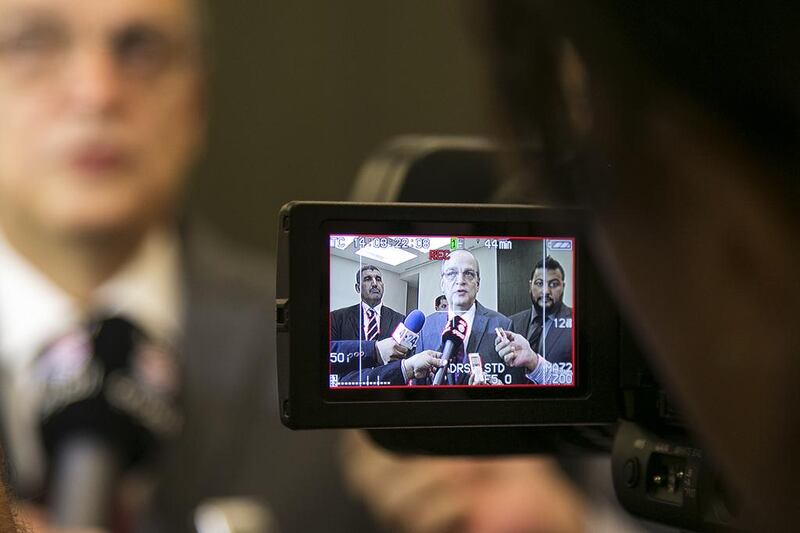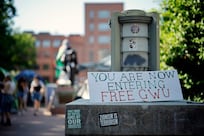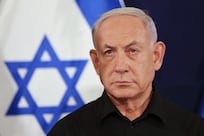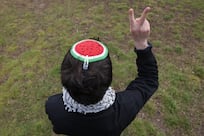During a meeting on the sidelines of last year’s World Economic Forum conference in Davos, former Syrian opposition chief Moaz Al Khatib was asked to speak to a group of senior diplomats about Syria. Instead of discussing the facts on the ground, he preached about the need for religious values.
Such stories are common among diplomats who have worked closely with the Syrian opposition. Several officials whose countries support the rebels spoke of incidents when opposition figures would bicker and backbite. “There might be five minutes left to discuss ideas,” one source said.
Because of the consistency of such behaviour, the source added, many in the international community have started meeting opposition figures “only out of courtesy”. According to official sources, Saudi Arabia and other key backers in the region have been left dissatisfied by infighting within the opposition.
Activists also complain that the political opposition rarely meet to brainstorm ideas, unless they are faced with a threat of political restructuring or when they have to choose a new leader.
In the past couple of weeks, the Syrian opposition seems to have reached a new low. As the United States assembled an international coalition to strike against ISIL inside Syria – potentially one of the most significant milestones for the Syrian rebellion – the opposition remained deeply divided over the appointment of Ahmed Touma as “prime minister” in the interim government, supposedly tasked with governing rebel-held areas. This is particularly bizarre, especially considering the position is meaningless, as four out of the five provinces outside the Assad regime’s control are held by either ISIL or Jabhat Al Nusra.
Also telling is the opposition’s attitude towards the fight between the Kurdish forces and ISIL in the Kurdish town of Kobani. The opposition, including prominent activists, have endorsed the Turkish position of essentially supporting the defeat of the People’s Protection Units (YPG) at the hands of ISIL.
Ironically, the opposition’s attacks against the Kurdish forces have echoed much of what the Al Assad regime has often used to attack the opposition itself.
For example, Bassam Jaara, the exiled opposition activist and senior member of the coordination committees, complained about the Free Syrian Army groups that have been fighting alongside the YPG: “When the Free Syrian Army fights with the YPG that has been killing the Syrian people, then it is not an army and it is not free.” This echoes what Bashar Al Assad said about the FSA two years ago.
Others reduced the local Kurdish push against ISIL to a YPG fight, saying that the YPG should not be supported because it included extremists, which also echoes the regime’s propaganda. It is also not hard to discern a Baathist tone in most of the criticism of the Kurdish forces.
The opposition has allowed itself to be a proxy for regional countries, and the bickering with regard to both Kobani and the interim government is a timely reminder of that sad fact. As David Ignatius suggested in the Washington Post last week, the bickering over Mr Touma was part of a proxy war between Saudi Arabia and Qatar. Also, the complaints about Kobani are hard to understand considering that ISIL brought the fight to Kobani and the Kurdish forces who had been present in that area for months, simply defended their town.
Until last week, the US-led coalition was very slow to strike against ISIL targets outside Kobani. If the international coalition chose to “liberate” a Kurdish area, as opposed to an Arab area, then complaints about the double standards can be justified. But that did not happen. Nowhere was the international coalition slower to block the advances of the ISIL than in the town of Kobani, betraying the fact that the campaign against the Kurdish forces in Kobani was nothing but a reflection of Turkish policy.
The story of how the Kurdish forces in Kobani and their FSA allies have defended the town should be told as a success story of brave men and women from Syria fighting against vicious jihadists. Instead, the opposition have given in to cynical instincts rooted in the very regime they are fighting. These views do not represent the interests of Syrians but those of other regional countries.
The opposition’s wrangling over the interim government and Kobani are only two examples of a long series of misguided policies and attitudes by the Syrian opposition. Instead of blaming outsiders for the protraction of the conflict and the rise of extremism, the Syrian opposition must recognise that such policies are a substantial factor behind the worsening situation.
Hassan Hassan is an analyst with the Delma Institute in Abu Dhabi
Twitter: @hxhassan





